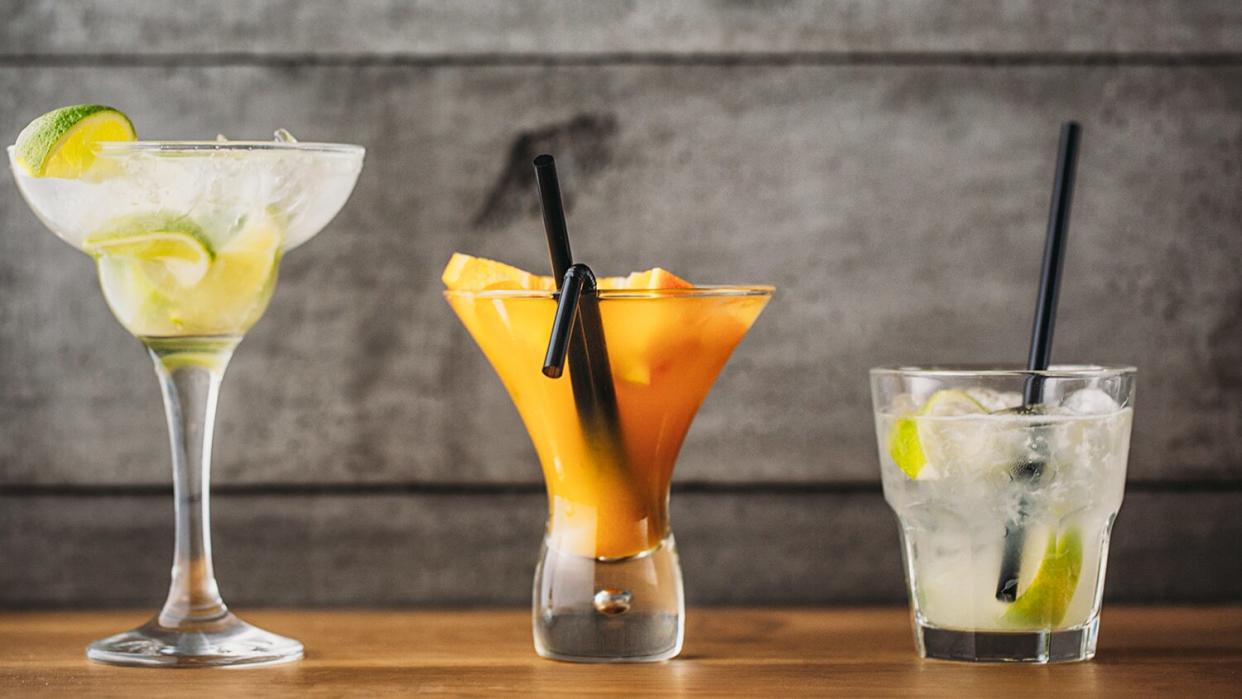What's the Least Dehydrating Alcohol?

Lumina Images / Getty Images
When you're thirsty—or after you've gone for a run—you probably don't reach for a beer, and you certainly don't mix an old fashioned. Yet one domestic brewery hopes to alter that (if slightly) with a thirst-quenching beer that, admittedly, doesn't go so far as to claim to actually hydrate you, which would go against all experiential wisdom about alcohol.
But the idea of a quenching, or perhaps even hydrating potable got us wondering, what boozy drinks could we sip to stay hydrated—or, more realistically, help us not get too dehydrated?
Turns out, some alcohols—and more accurately, how you drink them—can be less dehydrating that other booze-filled beverages. Here's the scoop from our experts.
First, what is dehydration?
You probably know dehydration as what happens to our bodies when we don't take in enough fluids. You can feel weak, dizzy, and thirsty. You might have dry eyes or a dry mouth. You can have a headache. "That's pretty close to those hangover symptoms, right?" asks Brigitte Zeitlin, M.P.H., R.D., C.D.N., and owner of BZ Nutrition. Yep.
But how does alcohol actually cause those unpleasant symptoms? Alcohol—despite being a fluid—inhibits the release of vasopressin, an anti-diuretic hormone that rushes to our defense when our concentration of electrolytes rise above a certain level. "When there is no anti-diuretic hormone, the kidneys are not able to reabsorb extra fluid and the urine is much more dilute, which means you lose more fluid," explains Alissa Rumsey, M.S., R.D., and author of Three Steps to a Healthier You.
With each drink, we prevent vasopressin from doing its job. And to top it off, both Zeitlin and Rumsey explain, drinking alcohol will also make you urinate more often.
So, which alcohols are the most hydrating—or the least dehydrating?
The bad news: "When it comes to alcohol, no drink you choose will be hydrating," says Zeitlin. But there's still some good news, too. Some alcohols are less dehydrating than others. "Basically, the lower the alcohol content in your beverage—whether wine, beer, or liquor—the less of a diuretic it is," Zeitlin says.
So consider this: the average beer has somewhere in the neighborhood of three to seven percent alcohol content in every 12-ounce serving, while a five-ounce glass of wine could have as much as 14 percent alcohol content. A single, one-and-a-half-ounce shot of liquor could contain up to a whopping 70 percent of alcohol content.
That makes beer the clear contender as the least dehydrating, with a big caveat. As important as alcohol content may be, even more important is how much you drink in a given sitting. Drink too many beers too quickly, and you'll end up as dehydrated as you would taking a shot at the bar. "Drinking one beer over the course of a dinner will not increase your blood alcohol levels as much as if you drank four beers in the same time frame," says Rumsey. So if you want to stay hydrated, slow down on beer.
What's the most dehydrating alcohol?
Because a beer—consumed slowly—is the least dehydrating, it's easy to jump to the conclusion that liquor is always the most dehydrating alcohol. But that's simply not the case. In fact, a mixed drink can be more hydrating (okay, okay, less dehydrating) than taking a shot. "Having a vodka soda, which has added water, may be less dehydrating than taking a shot of vodka because it will likely take you longer to drink the vodka soda—and the added water may help dampen the increase in blood alcohol levels," Rumsey explains.
Wine lovers also need to pay attention. "If you drink four glasses of wine, you will be more dehydrated than if you stopped at one drink that had one-and-a-half ounces of vodka," says Zeitlin. It's a number game: the fewer boozy beverages you drink, the more hydrated you will be. (And adding ice to a mixed drink doesn't hurt, either.)
A few last tips.
Beyond sticking to beer and sipping your beverage of choice slowly, you can take a few extra steps to increase your hydration. One is obvious: "To help stay hydrated while drinking, you can alternate alcohol and water," advises Rumsey. "This will give you some extra fluids to replace any that you may lose, and it can slow down how fast the alcohol content reaches your blood." You can also pour yourself smaller portions, Zeitlin suggests, which can trick you into thinking you're having more drinks when you're actually consuming less alcohol overall. Lastly, Rumsey advises, "pick beverages that can be sipped over time versus drinks that go down quickly like shots."
So while we'd love to hear that the ice in our blended Frosé or the cranberry mixer with our vodka is negating the toll alcohol takes on our hydration, the real lesson here is that there's no subtitute for just plain old water (and a little self-control).

